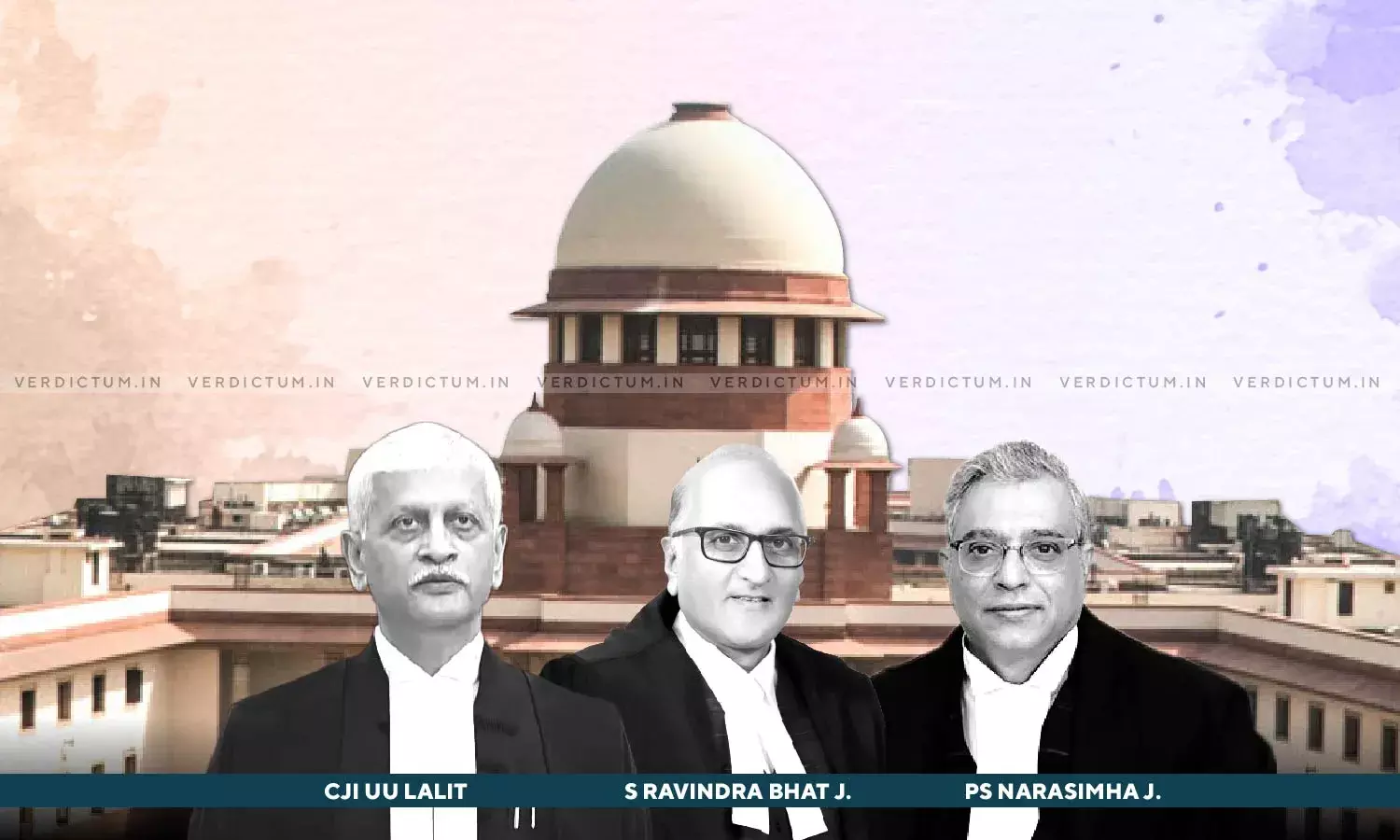Applicability Of Law Laid Down In A Judgment For Future Assessment Years Shall Be Based On Facts For Each AY- SC Clarifies

The Supreme Court while dealing with the miscellaneous application filed by the Assistant Commissioner of Income Tax seeking clarification of the judgment given by the Apex Court dated October 19th, 2022, and, connected appeals ordered that the Income Tax Authorities will apply the law declared in the judgment for the assessment years which the Court was not called upon to decide based on the facts of each assessment year.
The Bench of CJI Uday Umesh Lalit, Justice S. Ravindra Bhat, and Justice Pamidighantam Sri Narasimha stated –
"The reference to application of the law declared by this court's judgment, therefore, has to be understood in the context, which is that they apply for the assessment years in question, which were before this court and were decided; wherever the appeals were decided against the revenue, they are to be treated as final. However, the reference to future application has to be understood in this context, which is that for the assessment years which this court was not called upon to decide, the concerned authorities will apply the law declared in the judgment, having regard to the facts of each such assessment year. In view of this discussion, no further clarification is necessary or called for."
Advocate Anil Katiyar appeared for the appellant whereas, Advocate Deepanwita Priyanka appeared for the respondent.
In a judgment dated October 19th, 2022 the Supreme Court held that the entities created with the object of advancing general public utility cannot seek exemption under the Income Tax Act, 1961 under the head "charitable purposes" if they are engaging in any trade, business, commerce or providing any service for consideration. However, the assessee can engage in incidental trade or business or provide services for consideration and generate profits in the course of carrying out the general public utility. The trusts are entitled to seek income tax exemption if the receipts generated out of such incidental activities are within the quantified limits.
The Court provided in the course of achieving the object of general public utility, concerned trust, society or another such organisation can carry on trade, commerce or business or provide services in relation thereto for consideration that:
(i) The activities of trade, commerce or business are connected to the achievement of its objects of GPU, and
(ii) The receipt from such business or commercial activity or service in relation thereto, does not exceed the quantified limit, as amended over the years (Rs. 10 lakhs w.e.f. 01.04.2009, then Rs. 25 lakhs w.e.f. 01.04.2012, and now 20% of total receipts of the previous year, w.e.f. 01.04.2016)
The appellant by the application hence wanted a clarification of the above judgment and connected appeals. The clarification sought was that para 254 of the judgment should be such as to "enable the Revenue to redo the assessments in accordance with the above judgments for the past and examine the eligibility on a yearly basis for the future and thus render justice."
Paras 253 and 254 of the judgment recorded the Court's summary of conclusions in relation to each such trust, charity, or organisation.
The appellant urged that the clarification it seeks is necessary because in Para 253 H and in Para 254, it has been precluded from examining the facts and assessing the concerned assessment years, in relation to the assesses in the appeals. It was urged that the conclusions recorded in the judgment and those in the said two paragraphs, preclude it from dealing with the assessments of parties before this court and, furthermore, the dismissal of the revenue's appeals will preclude an examination of the merits for these assesses in future, as well.
Para 253 H in relation to the application of interpretation was read as follows:
"At the cost of repetition, it may be noted that the conclusions arrived at by way of this judgment, neither precludes any of the assessees (whether statutory, or non-statutory) advancing objects of general public utility, from claiming exemption, nor the taxing authorities from denying exemption, in the future, if the receipts of the relevant year exceed the quantitative limit. The assessing authorities must on a yearly basis, scrutinize the record to discern whether the nature of the assessee's activities amount to "trade, commerce or business" based on its receipts and income (i.e., whether the amounts charged are on cost basis, or significantly higher). If it is found that they are in the nature of "trade, commerce or business", then it must be examined whether the quantified limit (as amended from time to time) in proviso to Section 2(15), has been breached, thus disentitling them to exemption."
The Supreme Court therefore noted –
"A plain reading of the conclusions recorded in Para 253 (A)(B)(C) (D) and (E) would disclose that this court consciously recorded its findings, with the intent of finally deciding the issues, for various organizations- in relation to the assessment years in question, - whereas in Para 253 (F), the court remitted the matter for examination and orders by the assessing officer. Similarly, the conclusion in Para 253 G, was conclusive with respect to the claim of private trusts; the appeals were dismissed. These conclusions are accurately reflected in the final, operative directions in Para 254. In Para 254 (i) to (iv), the conclusions recorded are against the revenue. However, in Para 254 (v), (vi), (vii) and (vii), the conclusions, are in favour of the revenue."
Accordingly, the Apex Court disposed of the application.
Cause Title – Assistant Commissioner of Income Tax (Exemptions) v. Ahmedabad Urban Development Authority
Click here to read/download the Order


